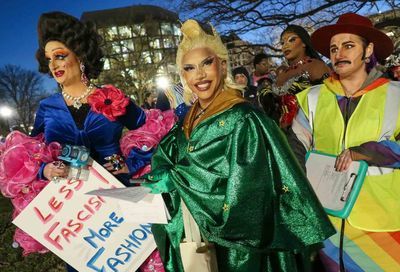Trump advisors urging him to use transgender rights as election wedge issue
Ads attacking Biden for allegedly supporting "gender change treatment for minors" to target swing voters in Michigan

We may soon find ourselves on the brink of yet another cultural war. Socially conservative activists, and some of President Trump’s closest advisors, are urging the president to attack transgender people as part of his re-election campaign.
Specifically, they’re telling him that he should come out opposing transgender participation in athletics, or the ability of transgender youth to receive medical treatments to help them transition, as a wedge issue in this year’s election.
According to a piece in Politico Magazine, the president’s advisors are split on the matter, with some — including Ivanka Trump and her husband Jared Kushner — advising him against jumping into the fray over a sensitive issue, while others, including Donald Trump, Jr., are certain he can clinch re-election by activating social conservatives and embracing hardline positions on social issues.
The first group of advisors fears a backlash should Trump begin opining on transgender issues, pointing to the various examples of how championing social issues has cost Republicans votes in elections.
The chief example they point to as evidence is the 2016 North Carolina gubernatorial election, where Republican Pat McCrory — who doubled-down on his support for the state’s anti-transgender “bathroom bill” — went down to defeat even as Trump was handily winning the state at the presidential level.
That group also warns that transgender issues don’t yet resonate or have salience with most voters, as most Americans don’t personally know a person who is transgender or nonbinary, and risks opening up Republicans and the president, once again, to charges of bigotry.
“Not only is it very risky, it’s really only an issue if it’s an issue for you,” an anonymous advisor is quoted as saying. “Until these issues saturate the mainstream, there is no reason the president should be mentioning them on the campaign trail.”
But the second group of advisors argues that Trump needs a game-changer at a time when he’s flagging in the polls due to his handling of the economy, the COVID-19 pandemic, and the ongoing civil unrest that has been sparked by police brutality and systemic racism following the officer-involved death of George Floyd in Minneapolis.
They argue the best way to change the narrative is to galvanize social conservatives and trumpet opposition to political correctness.
Those people — who are allied with others with similar views within the administration, including White House Policy Advisor Stephen Miller, Education Secretary Betsy DeVos, and Housing Secretary Ben Carson — say it’s malpractice for Trump not to seize on the transgender issues as a wedge issue to put Democrats on the defensive and make suburban moderates uncomfortable.
“It’s gross negligence to avoid the transgender debate and treat this suite of issues as irrelevant,” a Republican who speaks with Trump regularly told Politico Magazine.
See also: Connecticut trans athlete policy violates Title IX, says Education Department
The activist community is firmly on the side of the second group, with Doreen Denny, the vice president of government relations at Concerned Women for America, a socially conservative group, hypothesizing that Trump could sign an executive order barring transgender athletes from competing in women’s sports to help activate Republican voters.
Furthermore, social conservatives say, Biden, who has championed transgender equality and support for nondiscrimination protections both as vice president and since leaving office, is vulnerable on issues like allowing transgender youth to transition or transgender inclusion in sports — which they believe would help to paint him as out-of-step with the majority of Americans who actually vote.
That messaging is expected to be put to the test soon, as Terry Schilling, a conservative activist who runs the American Principles Project — which primarily champions cultural issues — is planning to run two ads in battleground Michigan that attack Biden for his support of transgender rights, accusing him of endorsing “gender change treatment for minors,” including surgery and hormone therapies.
One of the ads will feature former drag queen Kevin Whitt, now a born-again Christian and Republican activist, who will warn that children “need time” to develop a stable sense of their gender.
“As a young teen, I felt I should be a woman,” Whitt says in the ad. “Seventeen years later, I felt I should be a man again. Treatments to change the gender of a minor are very dangerous and irreversible.”

Schilling believes that exploiting the anxieties of suburban women and independents around transgenderism and gender-nonconformity will provide a successful path for Trump to rebound in the polls and become less reticent to championing culture-war issues on the campaign trail.
His arguments for this strategy are twofold: first, that voters are much more likely to vote when and become engaged over social issues, not economics; and second, that Republicans’ reticence to engage on social issues has hampered them and allowed the Left, and by extension, the Democratic Party, to enjoy electoral success without being seriously challenged.
As evidence, Schilling points to ads he ran in Kentucky’s 2019 gubernatorial race attacking Democrat Steve Beshear on his support for LGBTQ rights by running ads showing biological males dominating athletic competitions against cisgender females.
He claims the focus-group work he did revealed a good deal of unease among swing voters and suburbanites, who might support transgender equality in theory but balk at transgender athletes or allowing transgender people into restrooms matching their gender identity.
While Beshear won over incumbent Gov. Matt Bevin, Schilling says his theory that social issues are more motivating was vindicated, claiming that his ads resulted in a swing of 26,000 votes, delivering 13,000 additional votes to Bevin and making the race much closer. He believes the same dynamic is at play in the presidential race.
“What we found was the sports issue got the most powerful response from people, specifically conservative Democrats and independents,” he claims.
While it remains to be seen which re-election messaging Trump will ultimately embrace, Schilling says there’s no guarantee that even a Trump defeat will stop the issue from re-emerging in future campaigns, telling Politico Magazine: “No fight is ever really lost. We settled the socialism issue in the ’80s and now it’s coming back.”
But Jennifer Williams, a transgender woman and Republican from New Jersey who became the first out transgender Municipal Chair for the Republican Party when she was elected chairwoman of the Trenton Republican Committee, is in the opposite camp from Schilling. She doesn’t believe any attempt to use transgender issues as a wedge issue are going to work.
“Four years ago, they were trying to scare everyone by saying young children and women were going to be assaulted in restrooms. That never happened,” she told Politico, referring to the national debate that was sparked by fight over North Carolina’s HB 2 “bathroom bill.”
She also argues that using transgender issues as a wedge issue is a “dangerous betrayal” of Christian values and individual liberties — key tenets of political conservatism. Additionally, she notes, any votes gained through naked appeals to anti-transgender messaging can easily be offset by the loss of votes from people who would otherwise be more inclined to support the GOP.
“For every voter these scare tactics might get, there will be another voter asking why the president and his allies are focused on transgender children when people are worried about their jobs and whether they can feed their kids and pay their mortgages,” she says. “I don’t know the president personally, but I would discourage him from reducing my life and the lives of other transgender people to a political gimmick just because his poll numbers are bad right now.”
Read more:
Gay man denied entry to Arkansas casino for carrying a purse
Gay progressive Alex Morse rebuts “completely untrue” allegations of improper conduct
Georgia likely to send anti-LGBTQ QAnon conspiracy theorist to Congress
Support Metro Weekly’s Journalism
These are challenging times for news organizations. And yet it’s crucial we stay active and provide vital resources and information to both our local readers and the world. So won’t you please take a moment and consider supporting Metro Weekly with a membership? For as little as $5 a month, you can help ensure Metro Weekly magazine and MetroWeekly.com remain free, viable resources as we provide the best, most diverse, culturally-resonant LGBTQ coverage in both the D.C. region and around the world. Memberships come with exclusive perks and discounts, your own personal digital delivery of each week’s magazine (and an archive), access to our Member's Lounge when it launches this fall, and exclusive members-only items like Metro Weekly Membership Mugs and Tote Bags! Check out all our membership levels here and please join us today!



























You must be logged in to post a comment.